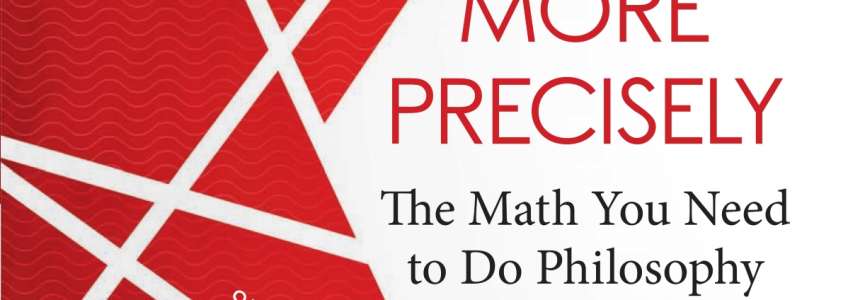Reflections on Philosophy and Math

Eric Steinhart, author of More Precisely: The Math You Need to Do Philosophy, shares his thoughts on the new edition of his book, and the practice of using math in philosophy.
Philosophers are increasingly using mathematical tools to make their arguments and to construct their theories. Analytic philosophers have long used mathematics, but recently philosophers usually associated with Continental thought have also been turning in that direction. In Being and Event, for example, Alain Badiou takes inspiration from set theory. So if you want to be able to appreciate and criticize much current philosophy, then you need to know the basics of set theory; you can learn these basics—and more—from More Precisely.
The second edition of More Precisely still includes material on relations, machines, semantics, probability, and infinity, but it adds material in several new areas: it goes into more depth about the use of cellular automata as models for universes; it contains new material on Conway’s game of life and explores the game’s relations to issues in the philosophy of science and religion; and it deals more with space, time, causality, and materiality. It also discusses the set of possible cellular automata as a logical space of possible worlds, using that space to discuss the fine-tuning argument for a divine designer.
One major addition to More Precisely is a chapter on information theory, which is playing an increasingly large role in the aspects of the sciences that are closest to philosophy. For example, entropy is a central—and often misunderstood—concept in information theory, so this new edition contains an extensive discussion of the topic. It is becoming more important to how we think about the brain, being used in new diagnostic tools for mental illnesses like depression, and playing a role in our understanding of anesthesia and our thinking about consciousness.
Other concepts from information theory are becoming more central than ever in philosophy of mind. Consider, for instance, the use of mutual information in recent theories of mental representation. Or consider the recent use of integrated information theory (IIT) to define consciousness. The new chapter on information theory gives you the tools you need to understand IIT, which has expanded beyond the analysis of individual minds. In their recent “Integrated Information as a Metric for Group Interaction” (see arxiv.org), David Engel and Thomas Malone discuss the use of IIT to measure the coherence of social networks, something that has implications for the existence of group minds or hive minds. IIT has also been used by Erik Hoel to mathematize the concept of “emergence.” Hoel uses concepts from IIT to argue that intentional agents are new objects that emerge from brains. Using IIT, Antonopoulos et al. argue that the neural network of the C. elegans worm generates more information than the sum of its parts (“Dynamical complexity in the C. elegans neural network”).
Game theory is perpetually interesting, so this new edition of More Precisely contains a chapter focusing on the aspects of game theory that are most useful for philosophers. Game theory concerns the formal aspects of cooperation and coordination and is therefore of special interest to social and political philosophy. Games such as the stag hunt have been used to analyze the emergence of norms, the emergence of free riders, and altruistic punishment. Game theory has also been applied in the cognitive science of religion, where watchful and vengeful gods are posited to punish free riders. Philosophers have used the famous prisoner’s dilemma game to explore the evolution of cooperation. When the prisoner’s dilemma is spatialized and iterated, it becomes a simple agent-based model. More sophisticated agent-based models are being developed to study the dynamics of economic, political, and religious systems, and such models can be used in evidence-based policy, where different policies are tested against each other in computational simulations. The use of such predictive simulations adds a new method to political philosophy.
It’s exciting to think about the role of mathematics in philosophy. Here philosophy resembles science, and if we look at the history of science we see a general tendency to increasing mathematization. Philosophy is likewise becoming more mathematized, in the sense that many traditional philosophical concepts are becoming more open to mathematical definition. One way to think about naturalism, for instance, is to define it as a research program that aims to progressively mathematize our concepts. If this definition of naturalism is right, then philosophy is becoming more naturalistic. So the role of mathematics in philosophy raises its own interesting philosophical questions. But to think about those questions, you need to know some mathematics. More Precisely helps you master the basics of the mathematics that you need in order to do philosophy.
